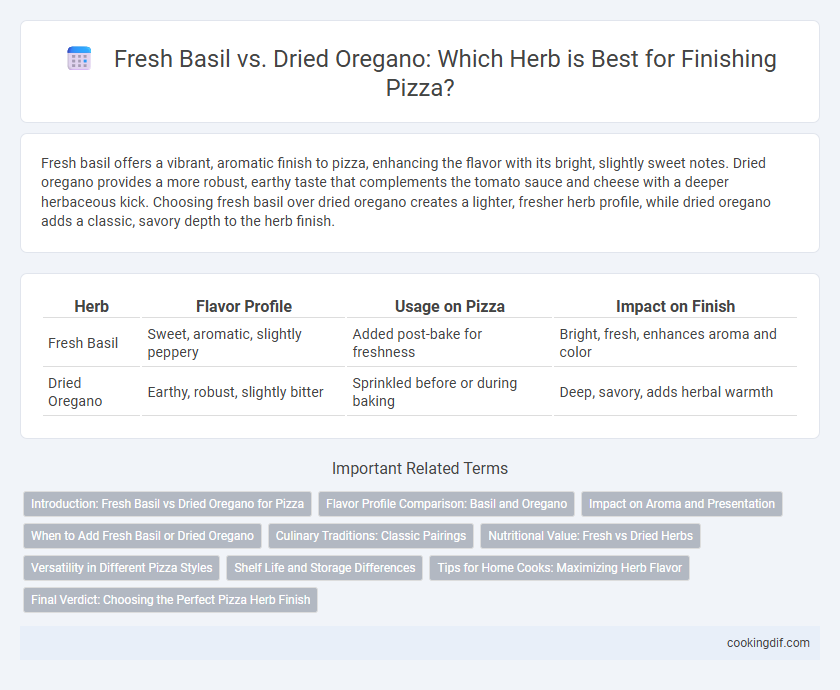Fresh basil offers a vibrant, aromatic finish to pizza, enhancing the flavor with its bright, slightly sweet notes. Dried oregano provides a more robust, earthy taste that complements the tomato sauce and cheese with a deeper herbaceous kick. Choosing fresh basil over dried oregano creates a lighter, fresher herb profile, while dried oregano adds a classic, savory depth to the herb finish.
Table of Comparison
| Herb | Flavor Profile | Usage on Pizza | Impact on Finish |
|---|---|---|---|
| Fresh Basil | Sweet, aromatic, slightly peppery | Added post-bake for freshness | Bright, fresh, enhances aroma and color |
| Dried Oregano | Earthy, robust, slightly bitter | Sprinkled before or during baking | Deep, savory, adds herbal warmth |
Introduction: Fresh Basil vs Dried Oregano for Pizza
Fresh basil and dried oregano both enhance pizza but offer distinct flavor profiles; fresh basil provides a vibrant, aromatic, and slightly sweet taste, while dried oregano delivers a robust, earthy, and slightly bitter note. Using fresh basil as a finishing herb preserves its bright color and delicate aroma, making it ideal for Margherita and vegetable pizzas. Dried oregano's concentrated flavor holds up well to high heat, making it perfect for classic pepperoni and meat-laden pizzas.
Flavor Profile Comparison: Basil and Oregano
Fresh basil delivers a bright, sweet, and slightly peppery flavor with aromatic hints of anise and clove, enhancing the freshness of pizza toppings. Dried oregano offers a robust, earthy, and slightly bitter taste with piney and minty undertones, providing a deeper, more pungent herbaceous finish. Combining fresh basil and dried oregano achieves a balanced herb profile, blending vibrant freshness with strong, savory notes ideal for classic Italian pizza.
Impact on Aroma and Presentation
Fresh basil delivers vibrant, sweet, and slightly peppery notes that elevate a pizza's aroma with a bright, herbal freshness, enhancing the sensory appeal and visual presentation through its vivid green leaves. Dried oregano contributes a more concentrated, earthy, and slightly bitter aroma, adding depth and traditional Italian flavor but offers a muted visual impact due to its desiccated texture and duller color. The choice between fresh basil and dried oregano significantly influences both the aromatic profile and the garnish's aesthetic, shaping the overall sensory experience of a pizza.
When to Add Fresh Basil or Dried Oregano
Fresh basil should be added to pizza after baking to preserve its vibrant aroma and delicate flavor, enhancing each bite with a bright, herbaceous finish. Dried oregano is best sprinkled on before baking, allowing its robust, slightly bitter taste to infuse the sauce and cheese throughout the cooking process. Timing the addition of these herbs optimizes their unique characteristics and elevates the overall pizza flavor profile.
Culinary Traditions: Classic Pairings
Fresh basil delivers a vibrant, aromatic finish to pizza, especially in traditional Margherita recipes where its sweet, peppery notes complement fresh tomatoes and mozzarella. Dried oregano offers a robust, slightly bitter flavor commonly found in New York-style and Mediterranean pizzas, enhancing rich tomato sauces and cheeses. Classic culinary traditions favor fresh basil for light, herbaceous profiles and dried oregano for hearty, bold finishes, each defining distinct regional pizza experiences.
Nutritional Value: Fresh vs Dried Herbs
Fresh basil contains higher levels of vitamin K, vitamin A, and antioxidants compared to dried oregano, making it a nutrient-dense choice for enhancing pizza flavor. Dried oregano offers a concentrated source of essential oils and antioxidants but loses some vitamin content during drying. Using fresh basil can boost the nutritional profile with more bioavailable nutrients, while dried oregano provides a potent herbal aroma with fewer calories and longer shelf life.
Versatility in Different Pizza Styles
Fresh basil offers a vibrant, sweet aroma ideal for Margherita and Neapolitan pizzas, enhancing their light, fresh flavor profiles. Dried oregano provides a robust, slightly bitter taste that complements heartier pizzas like Sicilian or meat-loaded styles, adding depth and a traditional Italian herb finish. Both herbs excel in versatility, with fresh basil best for delicate toppings and dried oregano suited for long baking times and richer sauces.
Shelf Life and Storage Differences
Fresh basil offers a vibrant, aromatic finish to pizza but has a short shelf life of about 5-7 days when stored in the refrigerator. Dried oregano maintains its potency for up to 1-3 years if kept in an airtight container in a cool, dark pantry, making it a more durable option for long-term storage. The moisture content in fresh basil causes rapid wilting and flavor loss, whereas dried oregano's low moisture preserves its essential oils and flavor compounds over time.
Tips for Home Cooks: Maximizing Herb Flavor
Fresh basil enhances pizza with vibrant, aromatic notes that brighten each bite, while dried oregano offers a robust, earthy flavor perfect for a deeper herb finish. To maximize herb flavor, add fresh basil at the end of baking or as a garnish to preserve its fragrance and bright taste, whereas dried oregano should be sprinkled before baking to release its full savory potential. For home cooks, balancing these herbs by using fresh basil for freshness and dried oregano for intensity elevates the pizza's overall flavor profile.
Final Verdict: Choosing the Perfect Pizza Herb Finish
Fresh basil offers a vibrant, aromatic finish with sweet and slightly peppery notes, ideal for enhancing Margherita and Neapolitan-style pizzas. Dried oregano provides a robust, earthy flavor with hints of bitterness, making it perfect for hearty, tomato-based pizzas like classic pepperoni. Selecting the perfect herb finish depends on the desired flavor profile: choose fresh basil for brightness and freshness or dried oregano for a traditional, savory punch.
Fresh basil vs Dried oregano for herb finish Infographic

 cookingdif.com
cookingdif.com